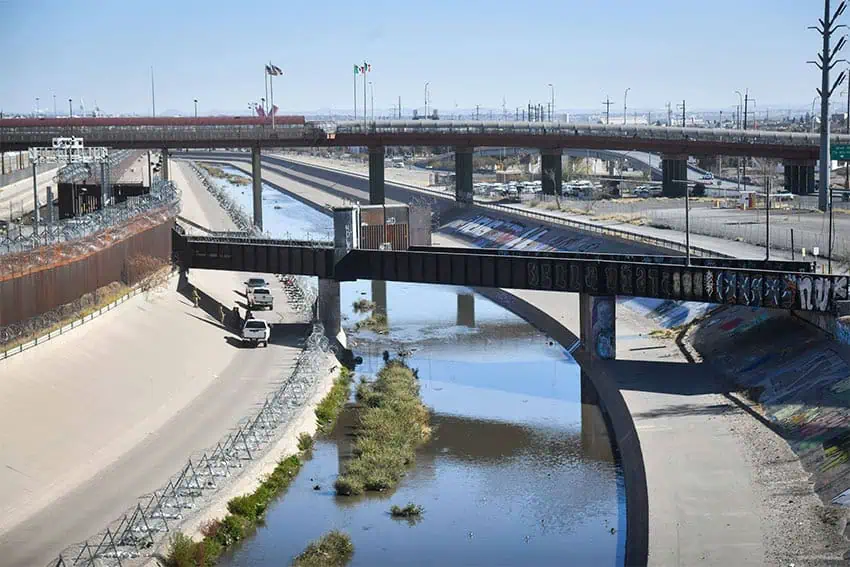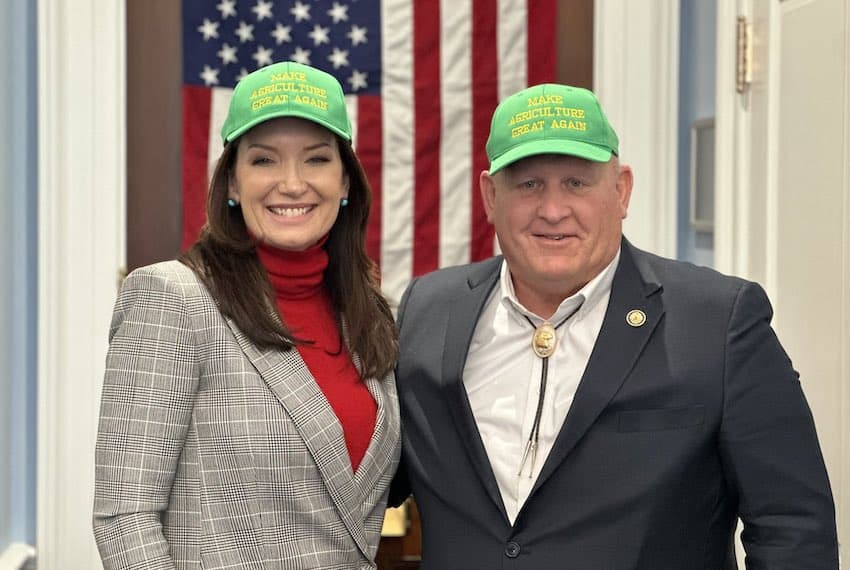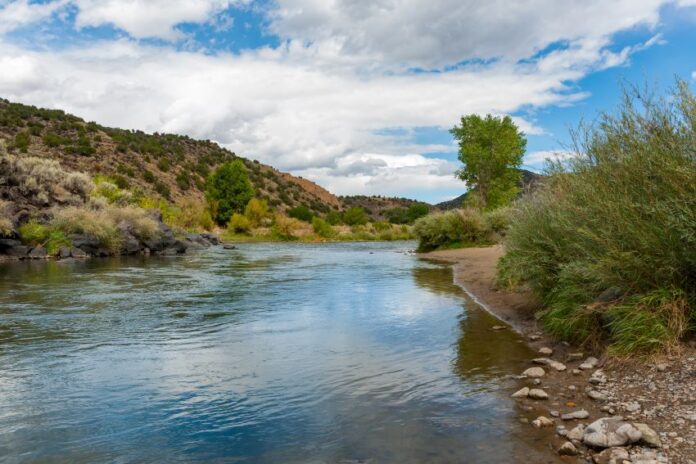The Mexican and United States governments announced on Monday that they had reached an agreement under which Mexico will immediately deliver water to the U.S. — to which it owes a huge quantity of water under the terms of a 1944 bilateral treaty — and temporarily give its northern neighbor a greater share of the water in six Rio Grande tributaries.
For now, at least, the deal has appeased the United States government, which has been pressuring the Mexican government to send more water to the U.S., with President Donald Trump even threatening to impose tariffs or other sanctions “until Mexico honors the treaty.”

The 1944 treaty stipulates that Mexico must send 2.158 billion cubic meters (1.75 million acre feet) of water to the United States from the Rio Grande every five years. In turn, the United States has to transfer 1.85 billion cubic meters (1.5 million acre feet) of water from the Colorado River to Mexico annually.
Four and a half years into the current five-year cycle, Mexico has only delivered about 30% of the water it is required to send from the Rio Grande to its northern neighbor.
Widespread drought in Mexico, which has been particularly severe in the north of the country, has had a major impact on Mexico’s capacity to comply with the 1944 water treaty.
However, President Claudia Sheinbaum has said that her government is committed to meeting its obligations and will do so “bit by bit.”
In a joint statement issued on Monday, Mexico’s Ministries of Foreign Affairs, Agriculture and the Environment said that the Mexican and U.S. governments had reached an agreement “for the good of both nations to attend to the issue of water allocations from the Rio Grande in the current five-year cycle of water deliveries,” which concludes Oct. 24.
“With the firm desire to continue with the fulfillment of its commitments under the 1944 treaty, which has been of great benefit for the development of the northern border of the country, Mexico has agreed with the United States to carry out a series of measures with the objective of mitigating the potential shortfall in water deliveries from Mexico,” the ministries said.
They said that the agreement provides for “immediate transfers of water” from Mexico to the United States as well as additional deliveries “during the upcoming rainy season,” which typically starts in late May.
Water is transferred from Mexico to the U.S. through a binational network of dams and reservoirs.
While it intends to increase water deliveries to the United States to meet its treaty obligations, the Mexican government stressed that a “fundamental premise” of the “actions” it will carry out is to “ensure the supply [of water] for human consumption” for communities in Mexico that depend on the Rio Grande.
It remains to be seen whether it can satisfy the United States without provoking major discontent in Mexico, where drought persists, water reserves are low and farmers have previously protested planned water transfers to the U.S. from specific reservoirs.
The United States Department of Agriculture (USDA) and the U.S. State Department also released statements on the new water agreement.
The USDA said that Secretary of Agriculture Brooke Rollins secured “the agreement of the Mexican government to meet the current water needs of farmers and ranchers in Texas.”
“… The Mexican government committed to transfer water from international reservoirs and increase the U.S. share of the flow in six of Mexico’s Rio Grande tributaries through the end of the current five-year water cycle,” the USDA said.
Rollins said that “Mexico finally meeting the water needs of Texas farmers and ranchers under the 1944 Water Treaty is a major win for American agriculture.”
“After weeks of negotiations with Mexican cabinet officials alongside the Deputy Secretary of State Christopher Landau, we secured an agreement to give Texas producers the water they need to thrive. While this is a significant step forward, we welcome Mexico’s continued cooperation to support the future of American agriculture,” she said.
“None of this would have been possible without the fervent support of our farmers from President Trump and his work to hold our trading partners accountable,” Rollins added.

In an April 10 post to social media, Trump asserted that he would “make sure Mexico doesn’t violate our Treaties, and doesn’t hurt our Texas Farmers.”
“Just last month, I halted water shipments to Tijuana until Mexico complies with the 1944 Water Treaty. My Agriculture Secretary, Brooke Rollins, is standing up for Texas Farmers, and we will keep escalating consequences, including TARIFFS and, maybe even SANCTIONS, until Mexico honors the Treaty, and GIVES TEXAS THE WATER THEY ARE OWED!” he wrote.
The USDA said that the new U.S.-Mexico water pact “solidified a plan for immediate and short-term water relief to meet the needs of Texas farmers and ranchers for this growing season.”
“It includes water releases and continued commitments through the end of this cycle which concludes in October. The United States welcomes further collaboration with Mexico on their treaty agreements with outstanding water debts in mind, specifically additional monthly transfers and regular consultations on future water deliveries,” it said.
The USDA also said that “Mexico’s persistent shortfalls in deliveries has led to severe water shortages for Rio Grande Valley farmers and ranchers, devastating crops, costing jobs and threatening the local economy.”
In a separate statement, a spokesperson for the U.S. State Department said that the United States and Mexico “also committed to develop a long-term plan to reliably meet treaty requirements while addressing outstanding water debts.”
“… The United States thanks President Sheinbaum for her personal involvement in facilitating cooperation across multiple levels of her government to establish a unified path to addressing this ongoing priority,” said department spokesperson Tammy Bruce.
The Mexican government said that the Mexican division of the bilateral International Boundary and Border Commission will monitor the “execution” of the “actions” Mexico carries out as it endeavors to meet its commitments under the 1944 water treaty.
It also said that Mexico and the United States had agreed that the treaty “offers benefits to both countries, and therefore its renegotiation is not considered necessary.”
The water agreement the two countries reached comes at a time when Mexico continues to engage in talks with the U.S. over the tariffs Trump has imposed on Mexican steel, aluminum and cars as well as other goods not covered by the USMCA free trade pact.
In March, the U.S. president briefly imposed 25% tariffs on all imports from Mexico and most imports from Canada due to what the White House said was the two countries’ failure to adequately stem the flow of “lethal drugs” such as fentanyl into the U.S.
There continues to be a range of tensions in the bilateral relationship, including ones related to tomatoes and screwworm cases in Mexico, but the potential for a conflict over water appears to have diminished significantly thanks to the agreement announced on Monday.
By Mexico News Daily chief staff writer Peter Davies (peter.davies@mexiconewsdaily.com)
